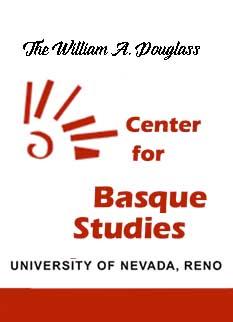On the 80th anniversary of the speech given by a young non-anglophone Basque at the Madison Square Garden in New York, a book about Lombana has been presented at the Sabino Araba Foundation in Bilbao.
Both authors underlined that the book collects "the incredible trajectory of José Luis de la Lombana, a young activist of the Basque Nationalist Party, born in Gasteiz within a Basque nationalist family, which during the years of the 1936 war and the subsequent dictatorship carried out a great anti-Franco activity calling for peace in Europe and the Americas and for Basque freedom".
Erkoreka and Anasagasti -authors of recommended monographs on the contemporary history of Euskadi and the Basque Government, with the collaboration of Xabier Irujo- have detailed during the presentation Lombana's life trajectory, from his education in Madrid, his participation in the anti-Franco resistance, his incarceration in Gasteiz, his departure to exile in France, his activism in Barcelona where he worked as an editor for the Basque nationalist newspaper Euzkadi, supporting the Basque Government in exile, and, finally, his long years of exile in Colombia.
The book focuses on Lombana's intervention at the Second World Youth Congress for Peace that took place in New York in 1938 where he argued against the pro-Franco propaganda in the United States. Lombana was one of the delegates of the Basque Nationalist Party in the World Youth Congress for Peace and during his period of activism in the United States, he made "innumerable observations about American society and the American Basques, establishing bridges between different North American groups and the Basques. All this within the framework of a complex and tumultuous period both in the United States and in the rest of the world."
In New York, Lombana who at the time was only 27 years old found a society that was not so uninformed about the war and the Basques. The Americans had followed through the press the ups and downs of the war and had a fairly clear criterion around the Basque reality. But in the end Lombana outlined a rather "pessimistic" approach. In his opinion there was little to be done from America to help Europe in general and Spain or the Basque Country and Catalonia in particular. Very little. Both geographically and intellectually, the United States felt alienated from Europe and its social, cultural and political problems.
The book also analyzes the first years of the delegation of the Basque Government in New York, three years before the arrival of Lehendakari Agirre escaping from the Nazis in World War II. There are also reports on the efforts to support the Basque Government in France and the United States and letters on the propaganda effort both in favor of Basque nationalism and the rebels and their international allies, Nazi Germany and Fascist Italy.



 Enviar a un amigo
Enviar a un amigo Añadir comentario
Añadir comentario









